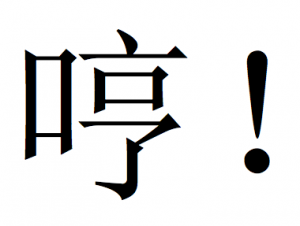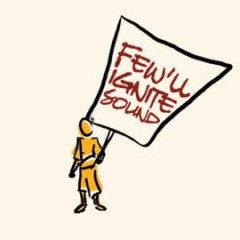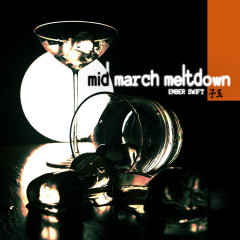Exclamative Particle Theory
 There were several language foibles between Guo Jian and I in the beginning of our relationship, some of which I have already written about (like in this blog about the “green beans”!) but the “哼” issue seemed to take a ridiculously long time to resolve.
There were several language foibles between Guo Jian and I in the beginning of our relationship, some of which I have already written about (like in this blog about the “green beans”!) but the “哼” issue seemed to take a ridiculously long time to resolve.
We still laugh about it five years later.
When we first got together, my Chinese listening skills quickly became better than my speaking skills. That’s not just because Guo Jian is a good talker (!) but also because I had been doing my fair share of listening to Mandarin-learning podcasts while in Canada. So, my ears had been getting sharper but I had had very few opportunities to speak the language.
So, in those early days when I returned to China in 2008 to give our relationship a go, I often couldn’t think quickly enough to have a fluent verbal response so, I’d just respond with a simple, “Hhmm.” This was often accompanied by the nodding of my head to convey the fact that I found what was being said of interest. So, in English, it would be short for “Hhmm, interesting!”
Now, in Chinese, there are several sounds that people make as part of conversation that aren’t exactly words, per se, but are known as exclamative particles. They have characters that are each preceded by the mouth radical (that little square to the left) indicating that they’re just sounds more than words meant to communicate mood or the spirit of the sentence.
We have a few of these in English too, like “Eh” at the end of sentences with implied questions in Canada, or “Oh!” when one is surprised or, “Hhmm,” like the example above for conveying an interest in something.
In English, though, it seems we have fewer of these words, and I believe it’s because we aren’t locked into a tonal language the way Chinese speakers are. Even though mood does get mixed with tone in China, the pitch of a sentence can’t convey all your emotion (the way that English sentences can) without compromising the Chinese tones, which are inherent in meaning. As a result, these extra characters are fairly important.
(More detailed info here)
Some common examples include 吧 (ba) at the end of a sentence when you’re making a gentle suggestion or want to encourage an action like “let’s go” (走吧!), or 呢 (ne) at the end of a sentence when you’re asking or even implying a question, like “and, you?” (你呢?). There are also lots of exclamations at the front of sentences like 哇 (wa) which is the equivalent of the English “wow!” or 嘿 (hei) which is the equivalent to the English “hey!”
So, when it came to our early conversations together, I started to notice that when I just said, “hhmm” to what Guo Jian was saying, he’d wind it up and stop talking. Sometimes he got quiet like his feelings had been hurt. I quickly learned how to say, “No, no, continue, I want to listen!” and he would reluctantly continue, but with a slightly different energy than before and I couldn’t figure out what I had done to make him clam up.
One day, he said angrily, “你哼什么?你不喜欢听我的话吗?” (“What is that ‘hhmm’ all about? Don’t you like listening to what I have to say?”)
And then I realized what had been going on.
Guo Jian had been misinterpreting my “hhmm” all this time with the Chinese 哼 (hèng). In other words, my “hhmm” was being misinterpreted as the English “Harumph” or “hmph” as though I were irritated or mad at him, or, as though I had an immediate negative response to what had just been said.
I had to laugh.
How many other Chinese men had been turned off of Western women for this reason? Could exclamative particles be the reason that there are so few 养媳妇儿 (Western wives) partnered with Chinese men? “Hhmm!” That theory is interesting!
Now, technically, “hhmm” can be said gently, but this is generally to convey another message rather than interest in English, such as “I’m thinking about what you just said” or “I’ll get back to you” or “I’m not sure how I feel about that yet!” It’s more long and drawn out with more emphasis on the “mm’s.” This one also usually sits in one’s lower register.
To express interest, however, we usually make the expression a bit more staccato in its duration, more pointed. There can also lie in the tone a bit of surprise and curiosity, so it’s a bit higher in pitch than one’s regular voice in order to remain good-natured. (Try it!)
But to him, it simply sounded like the Chinese “哼”(hèng) which is a disgruntled sound of displeasure, period.
And why is that? Well, Chinese girls (in China!) have a tendency to raise their voices into the child-like register in order to express dissatisfaction, as though they’re little kids who are whining with frustration. Alright, I’m generalizing, but these high-pitched fits are regular features when I’m eavesdropping in public places, so it’s common enough to be expected by Guo Jian, even though I’m not Chinese, nor have I any interest in acting like a little girl. It’s just not my style.
Oh how little we knew about each other then.
Hilarious.
When we finally realized this misunderstanding, I started to quickly add the “interesting” (有意思!) onto the end of my “hhmm” so that he knew that I wasn’t upset. There was a funny grace period where I’d still do my regular “hhmm” and then only remember how it could be misinterpreted when he’d shoot me a questioning glance with furrowed brow. Then I’d hastily add the “Interesting!” like I was reaching for a stray ball on the conversation’s tennis court and was just in time to volley it back safely to keep the game flowing.
It usually made us laugh. It just seemed so ridiculous that such a little thing could cause so much confusion.
He likes re-telling this story to people even five years later as an example of our early cultural differences. He exaggerates the 哼 (hèng) and raises his voice like a typical Chinese girl in the retelling and it makes everyone laugh, me included. Then I always chime in, though, to show the listeners, first and foremost, how I really do it in my culture, and then to point out that he’s henceforth proven that he’d make a better Chinese girl than I ever would.
And to this challenge against his gender, he always responds with a perfectly whiny “哼”(hèng)!
To which I say, “Interesting!” (有意思)
And we find ourselves thoroughly entertaining… 🙂







